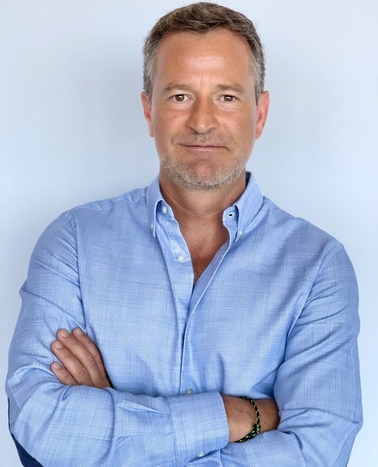
Daniel Fernández Kranz
I joined IE University in 2008, eight years after finishing my PhD in economics, because it offered me the opportunity to join a very international, open-minded institution. Now, I teach economics in several master’s programs here, as well as advanced management programs for companies in both Spain and the United States. People who know me closely often say that I must have been a fish in my previous life: I can spend hours in the sea. Traveling, especially to Asia, is my second passion. I also like to cook and add an innovative touch to dishes, with all the risk that this entails!
“I think that the few ‘a-ha’ moments in teaching have to do with those occasions in which one manages to make the student question their own pre-established ideas.”
Using research, data and tech to tackle global challenges
Daniel Fernández Kranz has built a long, well-renowned career in economics. His contributions to various areas of study have cemented Daniel’s place as one of the most prominent thought leaders in the field. For him, studying Economics is essential to deal with complex, real-life issues—using it as a vital tool in solving the most pressing problems in today’s world.
Daniel started teaching after completing his doctoral studies at the University of Chicago. After living abroad for some years, he valued the ability to work in an international environment. This desire led him to IE University, which he describes as “the closest you can get to working in a foreign environment without leaving Spain.” Now, he wears several hats at the university: he is the head of the Economics Department at IE Business School, as well as the vice dean for Economics at IE School of Global & Public Affairs. This multidisciplinary approach to the sector is evident in his research, which is focused on empirical microeconomics in several areas: labor markets, policy evaluation, family economics and gender economics.
The best part of teaching for Daniel are those few “a-ha” moments that come when he manages to make his students question their own pre-established ideas. This is similar to his approach to research, which involves exposing implicit assumptions and confronting them with reality. His own research has produced groundbreaking results that go a long way in tackling real-world issues.
For instance, in a 2021 paper published in the Journal of Public Economics—a joint work with Esther Arenas and Natalia Nollenberger—he explains how the COVID-19 pandemic changed not only the incidence but also the perception of intimate partner violence by employers; some even started proposing creative solutions that helped victims immeasurably. Daniel sees this as the perfect example of how economic research can be applied to the analysis of urgent social problems affecting the business world.
“IE University offered me the opportunity to join a very international, open-minded institution—the closest you can get to working in a foreign environment without leaving Spain.”
That’s just one of the reasons why he is so optimistic about the future of graduates in the field. From economic consulting in financial institutions to working in government organizations, NGOs and think tanks, to career advancement into a PhD in economics or related areas—they have access to a vast array of opportunities.
Furthermore, he believes that IE University is one of the best places to enhance their skill set: it emphasizes the rigor in thinking and analyzing data to extract causal relationships in big, complex datasets—something that’s very abundant nowadays. This data-driven approach also translates to IE University’s remarkable research community, which is working on very interesting topics, from labor relations to strategic decision-making in firms and much more.
In addition, he believes that to be successful, companies must take into account not only the revenue and short-term profits generated by their activities, but also their impact on society. This is the foundation of Business with Purpose, a philosophy he passionately espouses as the future of commerce. Through his research, Daniel analyzes how policy affects the behavior of companies and individuals, studying how the incentives generated from such policies ultimately impact social problems, as proven in an article published in 2021.
His advice to both current and future students of economics is simple: stay up to date with what’s happening in the world of economics. Keep abreast of the latest news and developments in economic thinking and behavioral economics. It’s the only way to effectively tackle the most important and relevant economic issues of the modern, data-driven world.
- “I think that the few ‘a-ha’ moments in teaching have to do with those occasions in which one manages to make the student question their own pre-established ideas.”